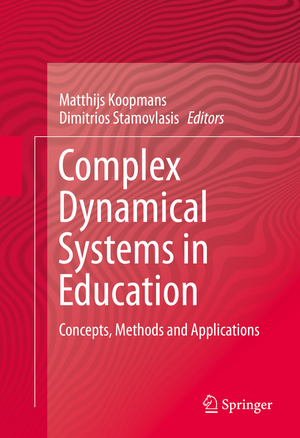Complex Dynamical Systems in Education: Concepts, Methods and Applications
Editat de Matthijs Koopmans, Dimitrios Stamovlasisen Limba Engleză Hardback – 4 mar 2016
This book capitalizes on the developments in dynamical systems and education by presenting some of the most recent advances in this area in seventeen non-overlapping chapters. The first half of the book discusses the conceptual framework of complex dynamical systems and its applicability to educational processes. The second half presents a set of empirical studies that
that illustrate the use of various research methodologies to investigate complex dynamical processes in education, and help the reader appreciate what we learn about dynamical processes in education from using these approaches.
| Toate formatele și edițiile | Preț | Express |
|---|---|---|
| Paperback (1) | 646.94 lei 43-57 zile | |
| Springer International Publishing – 8 apr 2018 | 646.94 lei 43-57 zile | |
| Hardback (1) | 653.33 lei 43-57 zile | |
| Springer International Publishing – 4 mar 2016 | 653.33 lei 43-57 zile |
Preț: 653.33 lei
Preț vechi: 768.62 lei
-15% Nou
Puncte Express: 980
Preț estimativ în valută:
125.02€ • 130.86$ • 104.05£
125.02€ • 130.86$ • 104.05£
Carte tipărită la comandă
Livrare economică 31 martie-14 aprilie
Preluare comenzi: 021 569.72.76
Specificații
ISBN-13: 9783319275758
ISBN-10: 3319275755
Pagini: 439
Ilustrații: XV, 412 p. 55 illus., 28 illus. in color.
Dimensiuni: 155 x 235 x 24 mm
Greutate: 0.78 kg
Ediția:1st ed. 2016
Editura: Springer International Publishing
Colecția Springer
Locul publicării:Cham, Switzerland
ISBN-10: 3319275755
Pagini: 439
Ilustrații: XV, 412 p. 55 illus., 28 illus. in color.
Dimensiuni: 155 x 235 x 24 mm
Greutate: 0.78 kg
Ediția:1st ed. 2016
Editura: Springer International Publishing
Colecția Springer
Locul publicării:Cham, Switzerland
Public țintă
ResearchCuprins
Introduction to Education as a ComplexDynamical System.- Complexity of School Environments and Educational Contexts.- A BatesonianPerspective on Qualitative Research and Complex Human Systems.- Emergence Self-Transcending and Education.- Opening the Wondrous World of the Possible for Education.- Towards the teaching ofmotor skills as a system of growing complexity.- The Fractal Dynamics ofEarly Childhood Play Development and Nonlinear Teaching and Learning.- Ergodicityand Merits of the Single Case.- Catastrophe Theory:Methodology, Epistemology and Applications in Learning Science.- Evaluating Complex Educational Systems withQuadratic Assignment Processes and Exponential Random Graph Model Methods.- Looking at’ EducationalInterventions Surplus Value of aComplex Dynamic Systems Approach to Study the Effectiveness of a Science andTechnology Educational Intervention.- Analyzing teacher-student interactions withState Space Grids.- Nonlinear Dynamical Interaction Patterns inCollaborative Groups: Discourse Analysis with Orbital
Decomposition.- Investigating the Long Memory Process in DailyHigh School Attendance Data.- Educational Systems andthe Intergenerational Transmission of Inequality: A Complex Dynamical SystemsPerspective.- The Symbolic Dynamics of Visual Attention DuringLearning: Exploring the Application of Orbital Decomposition.- A catastrophe model formotivation and emotions: Highlighting theSynergistic Role of Performance-Approach and Performance-Avoidance GoalOrientations.
Notă biografică
Matthijs Koopmans is Associate Professor and Assessment Coordinator at the School of Education at Mercy College. His professional interests include the application of complex dynamical systems approaches in education, cause and effect relationships and nonlinear time series. He published numerous research articles and book reviews in peer-reviewed journals including Evaluation and Program Planning; Nonlinear, Dynamics, Psychology and Life Sciences, and Complicity: An International Journal of Complexity in Education. He is one of the editors of Chaos and Complexity in Psychology: The Theory of Nonlinear Dynamics, published by Cambridge University Press in 2009. He earned his Doctorate in 1988 at Harvard Graduate School of Education.Dimitrios Stamovlasis is Assistant Professor of Research Methodology and Applied Statistics in Social Science at the Aristotle University, Department of Philosophy and Education. His research interests are interdisciplinary and they focus: on methodologicaland epistemological issues of contemporary social sciences that improve theory building; on nonlinear dynamics (complexity, catastrophe theory, entropy, and related fields) and their application to social, behavioral and life sciences; on specific research endeavors in the area of educational research concerning neo-Piagetian theories, learning, science education, problem solving, creativity and group dynamics. He published numerous research articles in peer-reviewed journals, and he served as a guest editor in the Special Issue of Nonlinear Dynamics, Psychology and Life Science (2014) focused on Nonlinear Dynamics in Education. He earned his PhD at the University of Ioannina (2001) and he also holds a M.Sc. in Physical Chemistry from University of Hawaii, an MBA, and a M. Sc. in Statistics from University of Athens.
Textul de pe ultima copertă
This book capitalizes on the developments in dynamical systems and education by presenting some of the most recent advances in this area in seventeen non-overlapping chapters. The first half of the book discusses the conceptual framework of complex dynamical systems and its applicability to educational processes. The second half presents a set of empirical studies that
that illustrate the use of various research methodologies to investigate complex dynamical processes in education, and help the reader appreciate what we learn about dynamical processes in education from using these approaches.
Caracteristici
Applies complex dynamical systems (CDS) approaches specifically to education Captures the dynamical processes hypothesized in the dynamical literature, such as emergence, second order change, and sensitive dependence on initial conditions Presents some of the most recent developments in the area of dynamical systems Includes supplementary material: sn.pub/extras


